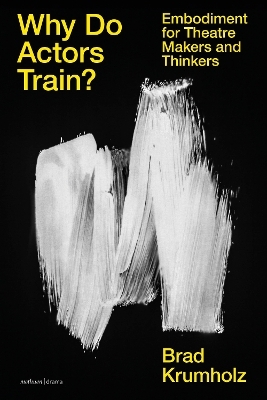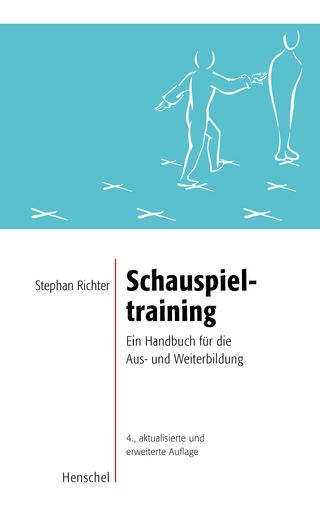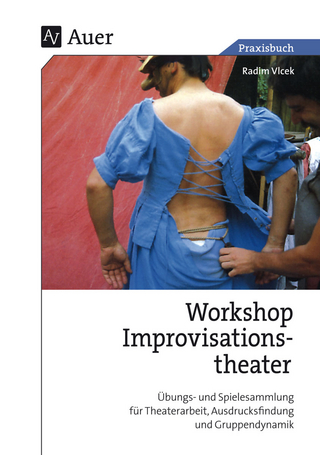
Why Do Actors Train?
Methuen Drama (Verlag)
978-1-350-23696-7 (ISBN)
'Embodied cognition' is a branch of contemporary philosophy which attempts to frame human understanding as fully embodied interaction with the environment. Engaging with ideas of contemporary significance from neuroscience, psychology, linguistics, and philosophy, Why Do Actors Train? challenges the outmoded dualistic notions of body and mind that permeate common conceptions of how actors work. Theories of embodiment are drawn up to shed important light on the ways and reasons actors do what they do.
Through detailed, step-by-step analyses of specific actor-training exercises, the author examines the tools that actors use to bring life and meaning to the stage. This book provides theatre practitioners and scholars alike with a new lens to re-examine the craft of acting, offering a framework to understand the art form as one that is fundamentally grounded in embodied experience.
Brad Krumholz is Assistant Professor and Head of Production for the Theatre Department at Hunter College, NY, USA. He is also Executive Artistic Director and Co-Founder of North American Cultural Laboratory (www.NACL.org). His recent publications include "The Problem of Movement Theatre" in Movement for Actors (Methuen Drama, 2013) and “Locating the Ensemble: NACL Theatre and the Ethics of Collaboration” in Encountering Ensemble (Methuen Drama, 2013).
Overview
i.What A Body Can Be – Defining Our Subject
ii.The Trouble with Mind/Body Dualism
iii.Embodied Cognition Defined
iv.Performance Philosophy – Contours of The Field
v.Acting and Technique
vi.Performance Styles Considered
vii.Making Meaning through Acting
viii.My Methodology
ix.Structure of This Book
Part One: Action in Theory and Practice
i.Introduction
ii.Training Exercises and The Plastiques
iii.Approaching Action through Wittgenstein
a.What Is Intention?
iv.Principles of Scenic Behavior
a.Mark Johnson and Image Schemas
v.Maxine Sheets-Johnstone and Animate Forms
vi.Where Is Meaning Located?
vii.The Importance of Interaction
viii.Concluding Thoughts
Part Two: Encountering Perception and Proprioception in The Actor’s Craft
i.Introduction
ii.The 3 Layers of Actor Training
iii.Alva Noë and The Enactive View
iv.The Role of Attention
v.Proprioception: Body Image and Body Schema
vi.Dynamic Space
vii.Competency and Presence
viii.Ways of Seeing
ix.Bodies Working Together
x.Achieving Fluency
xi.Concluding Thoughts
Part Three: Approaching The Voice beyond The Word
i.Introduction
ii.The Voice as Action
iii.Theorizing Sound and Voice
iv.Awakening The Resonators
v.Kreiman and Sidtis: Voice and Voice Quality
vi.The Embodied Voice
vii.The Components of Prosody
viii.Listening
ix.Gesture and Speech, Connected
x.Simulation and Vocal Production
xi.The Embodied Voice and Sociality
xii.Theatre as A Site of Engagement
xiii.Concluding Thoughts
Afterthinking
i.Introduction
ii.An Enactive Theory of Emotion
iii.Imagination as An Embodied Process
iv.Some Possible Concerns about This Book
a.Ethnographic Challenges
b.Epistemological Uncertainty
c.Other Limitations
v.Escaping The Dualistic Language Trap
vi.The Proficiency Model: Real Life Benefits of Actor Training
vii.Concluding Thoughts
Bibliography
Index
| Erscheinungsdatum | 13.02.2023 |
|---|---|
| Verlagsort | London |
| Sprache | englisch |
| Maße | 156 x 234 mm |
| Themenwelt | Kunst / Musik / Theater ► Theater / Ballett |
| Geisteswissenschaften ► Psychologie | |
| ISBN-10 | 1-350-23696-9 / 1350236969 |
| ISBN-13 | 978-1-350-23696-7 / 9781350236967 |
| Zustand | Neuware |
| Haben Sie eine Frage zum Produkt? |
aus dem Bereich


